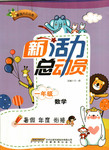题目内容
Poor his family was, he made up his mind to become somebody by his own efforts.
A. because B. since C. as D. for
C

 新活力总动员暑系列答案
新活力总动员暑系列答案 龙人图书快乐假期暑假作业郑州大学出版社系列答案
龙人图书快乐假期暑假作业郑州大学出版社系列答案Two years after the First World War (1914-1918), a small group of soldiers left the army and returned to their hometown in France. Most of them lived well, but one of them was poor. His name was Clinton. Once a year they had supper in Barton’s house. Barton was very rich.
One evening Barton showed his friends a large gold coin at the supper table. The coin was passed around and praised by everyone. At the same time they were talking and talking. They soon forgot about the coin. After supper, Barton asked for his coin, but nobody could tell where it was. It was lost. One man said that everyone must be searched. One by one they turned their pockets inside out. Only Clinton refused, however.“I didn’t steal the coin, and I will not be searched,” he said.After that, people turned their heads away from Clinton when they met him. He grew poorer. Soon his wife died.
A few years later, Barton had his house repaired. The lost coin was found under the floor. Barton felt sorry and went to Clinton to apologize. “But,” he asked, “you knew the coin was not in your pocket. Why did you refuse to be searched?” “Because I was a thief,” Clinton answered. “My pockets were full of food at that time. I had taken some food from the table to carry to my hungry wife and children.”
【小题1】The story took place ________.
| A.in 1920 | B.after 1945 | C.in 1950 | D.1916 |
| A.Clinton was rich | B.the supper was good |
| C.it was a large gold coin | D.they were happy |
| A.they were thieves | B.the gold coin was lost |
| C.Clinton stole the gold coin | D.they stole the gold coin |
| A.he was afraid to be found that there was some food in his pockets |
| B.he didn’t steal the coin |
| C.he was poor enough |
| D.the gold coin was in his pocket |
| A.people thought of him as a beggar |
| B.people took no notice of him |
| C.people look down upon him |
| D.Clinton refused to see his friends |
It was New Year’s Night. An aged man was standing at a window. He raised his mournful eyes towards the deep blue sky, where the stars were floating like white lilies on the surface of a clear calm lake. Then he cast them on the earth, where few more hopeless people than himself now moved towards their certain goal --- the tomb. He had already passed sixty of the stages leading to it, and he had brought from his journey nothing but errors and remorse. Now his health was poor, his mind vacant, his heart sorrowful, and his old age short of comforts.
The days of his youth appeared like dreams before him, and he recalled the serious moment when his father placed him at the entrance of the two roads --- one leading to a peaceful, sunny place, covered with flowers, fruits and filled with soft, sweet songs; the other leading to a deep, dark cave, which was endless, where poison flowed instead of water and where devils and poisonous snakes hissed and crawled.
He looked towards the sky and cried painfully, “O youth, return! O my father, place me once more at the entrance to life, and I’ll choose the better way!” But both his father and the days of his youth had passed away.
He saw the lights flowing away in the darkness. These were the days of his wasted life; he saw a star fall down from the sky and disappeared, and this was the symbol of himself. His regret, which was like a sharp arrow, struck deeply into his heart. Then he remembered his friends in his childhood, who entered on life together with him. But they had made their way to success and were now honored and happy on this New Year’s Night.
The clock in the high church tower struck and the sound made him remember his parents’ early love for him. They had taught him and prayed to God for his good. But he chose the wrong way. With shame and grief he dared no longer look towards that heaven where his father lived. His darkened eyes were full of tears, and with a despairing effort, he burst out a cry: “Come back, my early days! Come back!”
And his youth did return, for all this was only a dream which he had on New Year’s Night. He was still young though his faults were real; he had not yet entered the deep, dark cave, and he was still free to walk on the road which leads to the peaceful and sunny land.
Those who still wander on the entrance of life, hesitating to choose the bright road, remember that when years are passed and your feet stumble on the dark mountains, you will cry bitterly, but in vain: “O youth, return! Oh give me back my early days!”
【小题1】We can learn from the passage that ____.
| A.the man returned from a long journey and regretted what he had done |
| B.the man didn’t enter the deep, dark cave when he was young |
| C.the man was deserted by his parents when he was only a child |
| D.the man found it no use crying over the spilt milk |
| A.He wants to tell people it’s time to recall the past |
| B.he suggests the aged man will have a bright future |
| C.He tries to stress the man’s sad feeling |
| D.He expects people to share the man’s emotion |
| A.sorrowful, fearful and regretful | B.hopeful, cheerful and peaceful |
| C.regretful, painful and disappointed | D.disappointed, regretful and hopeful |
| A.encourage young people to take the right road | B.help the old man to pick up his confidence |
| C.describe the old man’s unsuccessful experience | D.show his compassion for the aged man |
Confucius (551BC~479BC), a Chinese philosopher,one of the most influential men in the history of China. Confucius was born in a noble family in the state of Lu. However,his parents were poor. His father died when Confucius was only three years old. In 527 BC he began his life as a teacher,usually traveling about and teaching the followers that were around him. Confucius worked as an official of the state of Lu. However,he soon left office to travel and teach. In 484 BC he returned to Lu,where he lived until his death.
Living in the turbulent(动荡的)period,Confucius believed that people must go back to the principles of the ancient wise men. He therefore lectured to his pupils on the classics and taught them how to behave properly in society. Confucius did not write down the principles of his philosophy. The Analects (《论语》),a work written by some of his followers,is considered the most faithful source of information about his life and teachings.
The teachings of Confucius were practical and moral,rather than religious. He said that man's behavior should be based on five virtues:kindness, uprightness(义),decorum(礼),wisdom and faithfulness(信).He asked everyone to fulfill their duties carefully toward the state. In the centuries after his death,his teachings,known as Confucianism,had a more powerful influence on the Chinese nation.
【小题1】At about what age did Confucius begin his teaching?______
| A.51. | B.27. | C.48. | D.24. |
| A.considered to have been written by Confucius |
| B.about the principles of the ancient wise men |
| C.about Confucius' life and his teachings |
| D.considered to be practical in tricks and evils |
| A.Confucius was born in a very rich family |
| B.Confucius served as an official in his lifetime |
| C.the teachings of Confucius are religious |
| D.Confucianism was more popular after Confucius died |